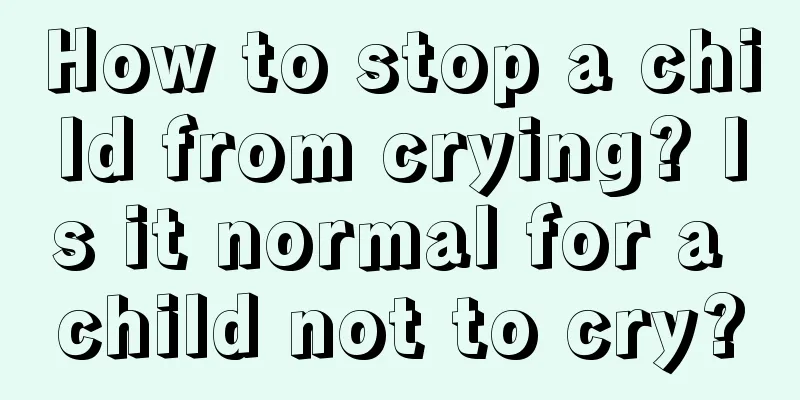What should I do if my baby is breathing rapidly?

|
Does your baby sometimes breathe fast and grunt? Or does he feel like he's having a hard time breathing? This could be due to respiratory distress. Respiratory distress is when your baby can't get enough oxygen to breathe, so they wheeze, breathe fast, and turn blue. This may require medication. Why is my baby breathing rapidly?Babies swallow foreign objects: It is easy for them to swallow objects by mistake and cause choking and suffocation. Babies and young children like to put things in their mouths, so the chance of choking and suffocation is very high.Your baby has a floppy throat: Babies sometimes develop a floppy throat, where the soft, immature cartilaginous upper larynx collapses inward during inhalation, causing airway obstruction.Because of laryngeal edema: Sometimes due to allergic reactions or inhalation injuries, laryngeal edema occurs, which hinders breathing, so the baby will have symptoms of difficulty breathing and shortness of breath.Because of certain infections: Sometimes babies may have respiratory distress due to certain infections, such as croup, epiglottis, throat abscess, etc. These infections can cause the baby's throat to swell and block the airway.Because of lung disease: If the baby has lung disease, such as bronchitis, pneumonia, asthma, bronchiolitis, etc., it may cause difficulty breathing and respiratory distress.What to do if your baby is short of breathSurfactant: Surfactant is a fluid that coats the lining of the lungs and keeps them open. Your doctor may continue to give your baby surfactant until their lungs are able to produce the fluid on their own.Respiratory support therapy: If your baby is in respiratory distress, he may need respiratory support until his lungs produce enough surfactant. A breathing tube connected to a surfactant production tube is a common treatment.Using medication: Doctors may also use medication to treat your baby, such as nasal sprays, cold and cough medicines, penicillin, decongestants, corticosteroids, etc.Avoid allergens: If your baby has symptoms of respiratory distress, keep him away from pets, outdoor pollen, indoor dust mites, mold, and other pollutants, all of which may cause breathing difficulties.Is it normal for my baby to be breathing rapidly?You must pay attention to the problem of infants' rapid breathing. Children have vigorous physiological metabolism, and their oxygen demand is close to that of adults calculated based on body surface area. Children can generally only meet the body's needs by increasing the number of breaths. The younger the age, the higher the respiratory rate.A normal newborn breathes 40 to 44 times per minute; 30 times per minute for children under 1 year old; and about 24 times per minute for children between 1 and 3 years old. To observe the breathing rate, it must be done in a quiet or sleeping state to be accurate. An increase in the breathing rate is a characteristic sign of pneumonia in infants under 3 years old.Newborns have narrow nasal cavities and rich blood vessels, so they are prone to nasal congestion. Therefore, loud breathing and sneezing are normal. Don’t worry. After one month, the baby’s nasal cavity will gradually develop and expand and the problem will disappear naturally. |
<<: What should babies eat to grow teeth quickly? What should they eat to be good for their teeth?
Recommend
How to solve the problem of infant intestinal bloating? What causes infant intestinal bloating?
Because babies are born not long ago, their stoma...
Is thin milk nutritious?
Many mothers will encounter the problem of thinni...
How long can breast milk be stored at room temperature? The correct posture for breastfeeding
Breastfeeding or formula feeding is a choice for ...
What should I use to wipe my baby's red bottom? Why is my baby's poop green?
It is common to see that the buttocks of newborn ...
How many days can Dinggui navel patch be used continuously? Can Dinggui navel patch cure diarrhea?
Many of us know that Dinggui Umbilical Patches ha...
What supplements should women take after miscarriage to help their bodies recover quickly?
Some women don’t even know they are pregnant. The...
What should I do if my baby has tonsillitis? What are the symptoms?
Babies can easily get tonsillitis due to a cold. ...
What should I pay attention to during the confinement period in October?
Postpartum women are weak, and confinement is to ...
What are the symptoms of formaldehyde poisoning? How to treat formaldehyde poisoning?
Today is a really eventful day. We have just seen...
How long after infusion can I breastfeed? Is breastfeeding after infusion good for the baby?
If a breastfeeding mother needs an IV drip after ...
What are the symptoms of baby convulsions? How to distinguish between baby convulsions and shocks?
Newborn babies are still in the process of slowly...
What should I do if there is a lump in the breast milk plug? Should I apply hot or cold compress to the breast milk plug?
Breastfeeding is also a technical job. New mother...
Can baby powder be used on baby eczema? Can baby eczema be applied with baby powder?
Babies' skin is usually very sensitive, so th...
What is the reason for the odor down there after childbirth? What should I do if there is an odor down there after childbirth?
It has been more than 10 days since I had a norma...
What to do if you always feel like vomiting during pregnancy? Tips for pregnant women to stop vomiting
It is very common to feel nauseous and want to vo...









